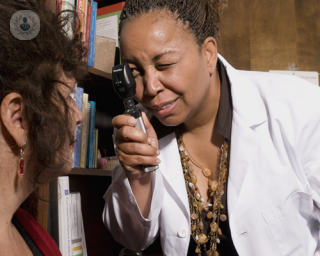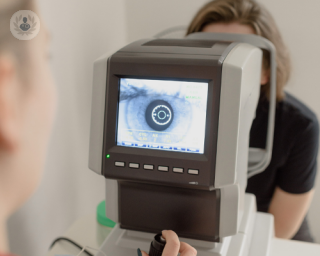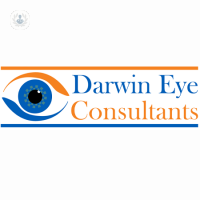What is visual impairment?
A visual impairment refers to loss of vision or the decreased ability to see at a ‘normal’ level. The WHO (World Health Organisation) estimates that there are approximately 1.3 billion people in the world living with some form of visual impairment. Visual impairment can be mild or severe, or refer to a complete loss of sight (blindness). Roughly 1.87 million people in the UK live with sight loss that has some kind of impact on their daily lives.

What are the causes of visual impairment?
The leading causes of visual impairment on a global scale are:
- glaucoma
- refractive error
- age-related macular degeneration (AMD)
- diabetic retinopathy
- trachoma
- cataracts
- corneal opacity.
The risk of visual impairment increases with age, as many visual impairments are connected to conditions occurring in old age. Diabetics and those who smoke are also at greater risk of developing a visual impairment.
What are the symptoms of visual impairment?
Symptoms depend on the cause of the specific impairment, however some signs that may point to a visual impairment include:
- Seeing floating shapes across your vision, e.g webs or lines.
- Seeing halos of light or flashes of light.
- Changes in iris colour.
- Blurred vision.
- Double vision.
- Sudden pain in the eye.
- Recurrent pain in or around the eye.
- Sudden change in vision.
- Painful sensitivity to light.
Visual impairments may also cause problems with everyday activities, for example you may find that you bump into things more frequently, or you have trouble walking downstairs/upstairs, or over uneven surfaces.
You may also find that reading becomes more difficult – you may notice that you have to hold material closer to your face, or you find it difficult to read in low light.
What is the treatment for visual impairment?
Treatment for visual impairment depends on the type of impairment itself. For example, refractive error can be corrected with glasses or the use of contact lenses, but other conditions, such as glaucoma, may need managing in other ways. Visual impairments may be treated through optical aids, medication, or surgical procedures such as laser eye surgery or glaucoma surgery.
Is there any way to prevent visual impairment?
The WHO estimates that roughly 80% of visual impairment cases worldwide are avoidable. Refractive error can be corrected with glasses (or contact lenses) and there are certain surgical procedures which can restore vision (e.g in cataracts). You can reduce your risk of developing a visual impairment by not smoking, and, if you are diabetic, following your doctor’s advice to monitor the condition.
Regular eye checks are recommended to spot the signs of visual impairment early on, particularly in older age.
Which specialist treats visual impairment?
An ophthalmologist (eye doctor) typically treats and manages visual impairments.
05-18-2017 12-12-2024Visual impairment
Ms Lina Osman - Ophthalmology
Created on: 05-18-2017
Updated on: 12-12-2024
Edited by: Jay Staniland
What is visual impairment?
A visual impairment refers to loss of vision or the decreased ability to see at a ‘normal’ level. The WHO (World Health Organisation) estimates that there are approximately 1.3 billion people in the world living with some form of visual impairment. Visual impairment can be mild or severe, or refer to a complete loss of sight (blindness). Roughly 1.87 million people in the UK live with sight loss that has some kind of impact on their daily lives.

What are the causes of visual impairment?
The leading causes of visual impairment on a global scale are:
- glaucoma
- refractive error
- age-related macular degeneration (AMD)
- diabetic retinopathy
- trachoma
- cataracts
- corneal opacity.
The risk of visual impairment increases with age, as many visual impairments are connected to conditions occurring in old age. Diabetics and those who smoke are also at greater risk of developing a visual impairment.
What are the symptoms of visual impairment?
Symptoms depend on the cause of the specific impairment, however some signs that may point to a visual impairment include:
- Seeing floating shapes across your vision, e.g webs or lines.
- Seeing halos of light or flashes of light.
- Changes in iris colour.
- Blurred vision.
- Double vision.
- Sudden pain in the eye.
- Recurrent pain in or around the eye.
- Sudden change in vision.
- Painful sensitivity to light.
Visual impairments may also cause problems with everyday activities, for example you may find that you bump into things more frequently, or you have trouble walking downstairs/upstairs, or over uneven surfaces.
You may also find that reading becomes more difficult – you may notice that you have to hold material closer to your face, or you find it difficult to read in low light.
What is the treatment for visual impairment?
Treatment for visual impairment depends on the type of impairment itself. For example, refractive error can be corrected with glasses or the use of contact lenses, but other conditions, such as glaucoma, may need managing in other ways. Visual impairments may be treated through optical aids, medication, or surgical procedures such as laser eye surgery or glaucoma surgery.
Is there any way to prevent visual impairment?
The WHO estimates that roughly 80% of visual impairment cases worldwide are avoidable. Refractive error can be corrected with glasses (or contact lenses) and there are certain surgical procedures which can restore vision (e.g in cataracts). You can reduce your risk of developing a visual impairment by not smoking, and, if you are diabetic, following your doctor’s advice to monitor the condition.
Regular eye checks are recommended to spot the signs of visual impairment early on, particularly in older age.
Which specialist treats visual impairment?
An ophthalmologist (eye doctor) typically treats and manages visual impairments.


All about vascular occlusions and their treatment
By Ms Lakshika Perera
2024-12-19
Administration of anti-vascular endothelial growth factor (VEGF) medications or corticosteroids directly into the eye to reduce inflammation and promote blood vessel regression. See more


Cornea guttata: What is it and when do their presence indicate eye problems?
By Mr Geraint Williams
2024-12-19
Cornea guttae can potentially lead to significant vision issues such as a significant reduction in vision. Here to provide a detailed and expert explanation about the nature of why they come together to form one mass – and more about the condition, including symptoms - is leading consultant ophthalmologist in Worcester, Hereford and Droitwich Mr Geraint Williams. See more


Early visual impairment: the brain or the eyeball?
By Mr Richard Bowman
2024-12-19
One of the most common causes of visual impairment in children in the developed world and increasingly so in the developing world, is damage to the visual parts of the brain as opposed to the eye itself. Mr Richard Bowman is a consultant paediatric ophthalmologist at Great Osmond Street Hospital, one of the world’s largest children’s hospitals, and associate professor at the International Centre for Eye Health in London. He conducts research into children’s eye problems and how to help them across the globe, and now he is sharing his insight with us. See more


Ask an expert: What impact does strabismus have on vision?
By Professor Saurabh Jain
2024-12-19
Highly respected consultant ophthalmic surgeon Mr Saurabh Jain gives an expert guide to strabismus, including when treatment is recommended, in this informative article. See more
Experts in Visual impairment
-
Mrs Kate Barnes
OphthalmologyExpert in:
- Cataracts
- Visual impairment
- Chalazion
- Paediatric ophthalmology
- Cataract surgery
- YAG laser capsulotomy
-
Professor Robert MacLaren
OphthalmologyExpert in:
- Retinal detachment surgery
- Retinal tear
- Cataract surgery
- Visual impairment
- Cataracts
- Retinal detachment
-
Mr Qasim Mansoor
OphthalmologyExpert in:
- Cataract surgery
- Refractive surgery
- YAG laser capsulotomy
- Multifocal contact lenses
- Strabismus (squint)
- Visual impairment
-
Mr Paul Haigh
OphthalmologyExpert in:
- Cataract surgery
- Strabismus (squint)
- YAG laser capsulotomy
- Visual impairment
-
Mr Avi Kulkarni
OphthalmologyExpert in:
- Glaucoma
- Trabeculectomy
- Minimally invasive glaucoma surgery (MIGS)
- Laser eye surgery
- Xen implant
- Visual impairment
- See all

Darwin Eye Consultants
Darwin Eye Consultants
Nuffield Health Shrewsbury Hospital, Longden Road
No existe teléfono en el centro.
By using the telephone number provided by TOP DOCTORS, you automatically agree to let us use your phone number for statistical and commercial purposes. For further information, read our Privacy Policy
Top Doctors

Tunbridge Wells Eye Centre
Tunbridge Wells Eye Centre
7 Vale Ave, Tunbridge Wells TN1 1DJ
No existe teléfono en el centro.
By using the telephone number provided by TOP DOCTORS, you automatically agree to let us use your phone number for statistical and commercial purposes. For further information, read our Privacy Policy
Top Doctors
-
Darwin Eye Consultants
Nuffield Health Shrewsbury Hospital, Longden Road, ShrewsburyExpert in:
- Blepharoplasty
- Cataracts
- Eyelid surgery
- Oculoplastics surgery
- Laser eye surgery
- Complex eye conditions
-
Tunbridge Wells Eye Centre
7 Vale Ave, Tunbridge Wells TN1 1DJ, Tunbridge WellsExpert in:
- Cataracts
- Oculoplastics surgery
- Laser eye surgery
- Refractive surgery
- Facial aesthetics
- Ophthalmology
- See all
- Most viewed diseases, medical tests, and treatments
- Diabetic retinopathy
- Retina
- Visual stress (Meares-Irlen syndrome)
- Presbyopia
- Nystagmus
- Myopia
- Hyperopia (farsightedness)
- Eye examination
- Demodex
- Blepharitis







